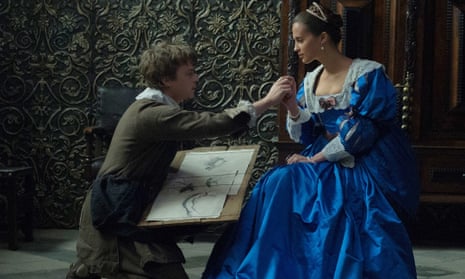Hollywood film-making is all about big bets, and somewhere along the way, enough reasonable people convinced themselves that a period drama full of corsets, ruffs and tavern wenches set against the 17th-century Dutch tulip market was going to be a hit. But now that Justin Chadwick’s much-delayed adaptation of Deborah Moggach’s novel has finally been released, we must look to the words Alicia Vikander’s love-and-economics-struck Sophia Sandvoort says during her darkest moment: “The fever has broken.”
Tulip Fever isn’t a disaster. The first half is actually fairly decent, occasionally threatening to be good. It follows Vikander’s Sophia from her life in a convent to her loveless marriage with the benign dope and peppercorn magnate Cornelis (Christoph Waltz). All Cornelis wants in life is a son and heir, and the montage of the Sandvoorts’ attempts at conception rivals The Right Stuff’s collage of failed rocket launches. As melancholy consolation, Cornelis hires a local artist (a future Dutch master?) to paint a dual portrait, so there will be at least some legacy.
In the book, I’m sure there are smoldering passages that express how Sophia and the artist Jan Van Loos instantly fall in love, but since Jan is played by Dane DeHaan, who has all the vitality of a bowl of oatmeal left in the rain, we have to take this on faith.
While Sophia and Jan are making eyes at one another, something is blossoming in the taverns of Amsterdam. Tulipomania is rattling the coffers of commoners and wealthy alike, creating history’s first great futures exchange and (spoiler alert?) devastating bubble economies. Along for the ride are the Sandvoorts’ vivacious maid, Maria (Holliday Grainger), and her fishmonger lover, William (Jack O’Connell), who hopes to grow his fortunes.
The setting is all very interesting (and the art direction looks nice) but at about the halfway mark, the potential quickly shrivels. Sophia visits Jan in his artist’s garret holding some tulips, ostensibly for him to scrutinize for their portrait. But just as she crosses the threshold, the petals open up. Everybody got that?
Tulip Fever’s second half is a harvest of stupidity, with mistaken identities, overheard conversations, characters conveniently swept away by circumstance and Cara Delevingne as a combination prostitute/commodities trader who shouts “see ye later in the tavern!” as she drips out of her dress. It’s as if three full seasons of Days of Our Lives were shipped to the Netherlands and crammed into 45 minutes. Complications arise when Maria finds herself in the family way, but Sophia and Jan concoct a ludicrous plan that could, potentially, make everyone’s dreams come true.
We aren’t always privy to a film’s backstage drama ahead of the fact, but even if Tulip Fever weren’t one of the more notorious delayed movies of recent years it would still be quite evident that this was recut into oblivion. After Jan tries to steal tulip bulbs from Sophia’s old nunnery, he approaches the abbess (a pipe-smoking gardening and finance whiz played by Judi Dench) and says: “I’d like to a get a foot in the tulip business.” Five minutes later, this libertine painter is sighing: “If only I were liquid!” Soon thereafter, two characters try to calm Sophia, telling her: “You’re in our house.” We’ve never seen them before. Zach Galifianakis shows up and rides a donkey.
There are, indeed, some sparks in this movie. The Vikander/DeHaan romance is a dud no matter how well it’s lit, but the “downstairs” passion between Grainger and O’Connell has a degree of realism and eroticism. Eigil Bryld’s cinematography is crisp and colorful. And Christoph Waltz’s not-quite villain is a very unique and tender performance. Catch these moments as they bloom, though, because the whole thing quickly dries out.
- Tulip Fever is out now in US cinemas with a UK date yet to be announced

Comments (…)
Sign in or create your Guardian account to join the discussion